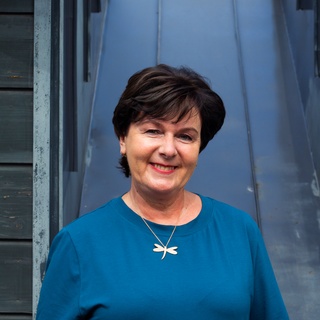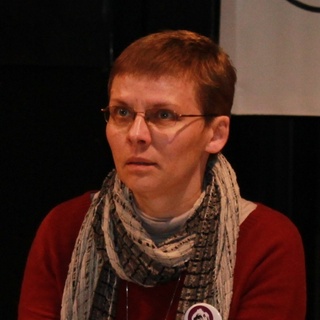Annual admission
Course Brief
- Language of study: Latvian
- Number of budget and paid study places: 4/4
- Tuition fee per year: EUR 4500
- Duration of studies: three years (6 semesters)
- Degree to be obtained: Doctor of Science (Ph.D.) in Humanities and Arts
- Place of study: Riga, 24 Ludzas Street
- International mobility opportunities: studies, internships and graduate internships within the ERASMUS + exchange programme, opportunity to use foreign government scholarships and participate in summer schools
- Head of the Programme: Assoc. prof., Dr. art. Anita Vaivade
The aim of academic doctoral study programme "Arts" of the Latvian Academy of Culture is to prepare experts of international scale in the field of Humanities and Arts. The priority of the study programme is interdisciplinarity methodology-based fundamental research of art phenomena and the processes of the creative sector. The study programme creates prerequisites for the creation of new fields of research, as well as innovative research approaches, which have a significant impact on the field of humanities and arts in Latvia, allowing not only to understand a wide range of cultural and historical phenomena, but also to effectively solve the topical problems of the fields of culture and creative industries.
The tasks of the study programme are:
to provide students with the opportunity to conduct interdisciplinarity methodology-based scientific research in the field of cultural theory, cultural studies and creative industries in accordance with the international principles of open scientific activity and academic freedom; 2. to provide in-depth knowledge on the most topical research strategies in the fields of cultural sciences and creative industries, which allows to understand, interpret and critically evaluate the connection of cultural and artistic phenomena with wider social, political and economic contexts; 3. to expand internationally transferable doctoral-level knowledge and research skills, which are based on modern theoretical approaches and can be effectively used in solving problems in the fields of culture and creative industries; 4. to encourage the doctoral students to learn, integrate and synthesize the theories and methodologies of various disciplines, thus creating innovative interdisciplinary knowledge in the fields of humanities, arts and creative industries; 5. to promote the abilities of the doctoral students to communicate their research results to an international academic audience in the form of conference reports and anonymously peerreviewed scientific publications; 6. to ensure the regeneration of the academic staff, encouraging the involvement of the doctoral students in national and international research projects implemented by Latvian Academy of Culture, as well as in managing and reviewing the research papers of bachelor’s and master's students; 7. to develop the digital skills of the doctoral students specifically required in culture and arts, to provide a beneficial study environment for the dissemination of technological and nontechnological innovations in the fields of culture and arts.
The studies within the Doctoral study programme are organized as meetings with the supervising professor based on mutual agreement, typically once or twice per academic year.
During the studies doctoral students have to pass two qualifying examinations:
- Theory of Culture
- Foreign Language (usually English)
22 July, 2024
Application procedure
Application deadline for applicants from EU, EEE + candidate countries
Application form and application documents must be submited to e-mail: uznemsana@lka.edu.lv
- passport or identity card (eID both sides);
- document certifying higher education (diploma for obtaining a master's academic degree in Latvian or English (documents submitted by the applicant in another foreign language must be accompanied by a notarized Latvian or English translation);
- a coherent justification of the chosen topic of the doctoral thesis, as well as of the theoretical basis of the research description of the research basis (3-5 pages) agreed with a potential supervisor - a doctoral lecturer elected by the Academy;
- College departments or other scientific or academic institutions recommendation(s) or letter(s) of recommendation from an appropriate professional;
- copies of your published scientific articles;
- Curriculum vitae in Europass format, including a record of activities to date in the field of scientific research, as well as information on Bachelor's and Master's degrees or other previous education and foreign language skills;
- confirmation of payment for the application registration service (EUR 50).
If any of the documents submitted or presented to the Admissions Committee have a different surname (first name) or personal identification number than the surname (first name) or personal identification number in the person's passport or identity card, a copy of the document certifying the change of surname (first name) or personal identification number must be attached.
Persons who have received their previous education abroad have their academic degrees and diplomas examined by the Latvian Academic Information Centre before applying for studies.
Applicants' take an entrance examination "Interview and evaluation of scientific contributions".
The entrance examination is assessed in a 100-point system:
- motivation to study in the sub-programme, ability to present oneself in writing (motivation letter) and orally (1-30 points);
- understanding and knowledge of the current affairs of the cultural industry, cultural management and cultural policy in Latvia (1-30 points);
- Master's thesis topic design, its relevance and adequacy to the study programme (1-20 points); knowledge of the English language (1-20 points).
Scientific quality of the thesis proposal (1-30 points);
Institutions in the planned research of the dissertation topic (scientific articles, publications, participation in conferences and research projects) (1-20 points);
Relevance of the topic of the doctoral thesis and relevance to the Academy's research priorities (1-15 points);
Research skills demonstrated during the Master's degree or equivalent studies, letters of recommendation and reference from a potential supervisor or other references (1-10 points);
length of service related to the topic of the thesis or related to work at the Academy - (1-10 points);
the applicant's motivation to study in the programme (1-15 points);
STUDY INFORMATION
FINANCIAL SUPPORT
WHY STUDY IN LATVIA/ LATVIAN ACADEMY OF CULTURE
GENERAL AND PRACTICAL ADVICE
2023
Daniela Zacmane "Melodrama Modality in Cinema and the Narrative of Coming-of-age in Latvia’s Feature Films (2013-2023)”
Elīna Vikmane “Advancing Cybermuseology: Diffusion of Digital Innovation in the Latvia’s Museum Sector”
Ivars Šteinbergs “Latvian Poetry Translation in the Soviet Period: Cultural Translation and Translation Strategies”
2022
Zane Balčus "Texts and contexts of documentary films: themes, styles and systems in Latvian cinema”
Agnese Hermane “Manifestations of Leadership in the Management of Artistic Collectives of the Song and Dance Celebration”
Zane Daudziņa “Actors’ Speech in 21st Century Latvian Theatre”
2021
Valda Vidzemniece “Modern Dance in Latvia in the First Part of the 20th Century”
Rita Lūriņa “Gesture in Latvian Dramatic Theatre and Actor’s Education (late 19th century – 30-ies of the 20th century)”
Uģis Nastevičs "Latvian Dievturība and Japanese Shintō: A Comparative Study of Rituals, Their Sacred Space and Texts”
2018
Valda Čakša "National Conservatories in the Cultural Environment of Latgale (1923-1941)” 2017
Zeltīte Barševska „Representation of Ethnicity in Traditional Art: the Example of Latgalian Old-Believers’ Adorned Towels in the 20th Century”
2016
Astra Spalvēna "Cultural-Contextual Analysi of Food Adaptation in Sign Systems”
Ieva Pīgozne "Colours and Their Meaning in 3rd-13th Century Baltic Dress in the Territory of Latvia”
2015
Andris Vecumnieks „Theatricality Phenomenon in Music. Theatre Space of Juris Karlsons”
Dāvis Sīmanis "Structuring Historical Narrative in Films: the Model of Southern Renaissance”
Laila Niedre „Die Rolle der deutschen Sprache in der Kommunikation der lettischen Wissenschaft im transkulturellen Kontext des 21. Jahrhunderts”
2014
Zane Radzobe „Alvis Hermani’s Theatre Tradition and Innovation”
Inga Sindi „Life-Stories in Theatre: Motives and Strategies of Narrating”
2013
Baiba Tjarve „Institutional Transformations in Latvian Culture in The Post-Communist Transition, 1991-2010”
Elīna Krasovska „Metonymy and Figurative THINKING: a Cognitive Stylistic Approach”
2009
Ieva Pauloviča „Sacred Music in Vidzeme During the Latter Period of the Swedish Empire (1660-1710)”
2012
Anna Kalve „Phenomenon of Conceptual Metaphor”
2011
Anita Vaivade „Conceptualisation of Intangible Cultural Heritage in Law”
2007
Inga Pērkone-Redoviča „Cinema in the Context of Latvian Culture 1920-1940”
Zane Šiliņa "Idea of The New World in Rainis’ Plays”
Nadežda Pazuhina „Die Kulturpolitiken der russisch-othodoxen Altglӓubigen Lettlands: Erfahrung des 20. Jahrhunderts”
Ieva Vītola „Historico-Cultural Lanscape in the Interdisciplinary Perspective of Folklore Studies and Archaeology:Hidden Tresure Places and Search for Tresures in Latvia”
2005
Rūta Muktupāvela „ Comparative analysis of figurative forms of enculturation”
2003
Deniss Hanovs " The Baltic Herald - a Cultural Forum for Latvian Citizenship"
Head of the Programme: Assoc. prof., Dr. art. Anita Vaivade, anita.vaivade@lka.edu.lv
☎ +371 67140174
✉ uznemsana@lka.edu.lv






